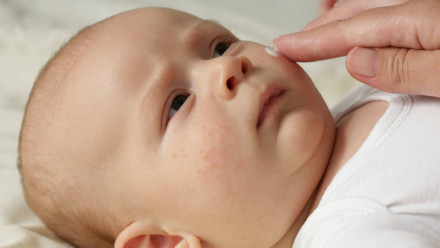Photo: iStockphoto
If you followed the recommended vaccination schedule in your province, your kid got the chicken pox vaccine. But does the shot guarantee they’ll be free of the itchy spotted virus, also called varicella, forever? We asked some experts to break down when your kid should get the chicken pox vaccine, how effective it is, and what to do if they come down with the blistering spots.
Who should get the chicken pox vaccine?
The chicken pox vaccine is part of the routine vaccinations given across the country, but when your kid receives it depends on your province’s program schedule. In all the provinces and territories, except for Ontario and Nunavut—where your kid would get the shot at 15 months—the first dose is given at 12 months. The timing of the second dose varies—for example, if you’re from Quebec or Saskatchewan, the second dose would be administered at 18 months. If you live in Manitoba, shot number two is given between ages four and six. You can find your schedule at CANImmunize.ca.
Both doses of the vaccine are publicly funded across Canada, and Nicole Le Saux, professor of infectious diseases at the University of Ottawa and chair of the Canadian Paediatric Society’s Infectious Diseases Committee, says all kids should be vaccinated, except for a few instances where it’s not recommended. “We don’t give it to people who have had bone marrow transplants [or] people who have immunodeficiency problems,” Le Saux says. This is because the vaccine is live—it’s a weakened version of the virus, and those with weakened immune systems can’t produce the antibodies to fight it.
The vaccine is not just for your kids, either. If you never had the itchy spots, you should consider talking to your doctor about getting the shot. “If you’ve never had chicken pox in your life, it would definitely be a good thing to get the vaccine because natural chicken pox in adults or older adolescents or in pregnancy can cause significant disease,” Le Saux says.
Can my kid still get chicken pox if they’ve had the vaccine?
When the vaccine was first introduced in Canada, kids were only given one dose—which provided 94 percent protection. After doctors saw some breakthrough chicken pox in patients who had only received one shot, a second one was added in the early 2000s. With two doses, the vaccine is greater than 98 percent effective at preventing all varicella and almost 100 percent effective at preventing severe chicken pox according to Anne Pham-Huy, the program director of CHEO’s Pediatric Infectious Diseases Training Program. That means that it’s possible (but unlikely) that your kid could still get

An age-by-age guide to skin rashes and conditions
chicken pox but if they do, they will have a much milder case—around 30 lesions—than if they had not gotten the vaccine. Unvaccinated kids who get regular, run-of-the-mill chicken pox will have 250 to 500 spots, according to Le Saux.
Another reason to get the vaccine: the chicken pox blisters can get infected with Group A streptococcus (or another skin bacteria) which can cause a severe infection and lead to necrotizing fasciitis, better known as flesh eating disease, says Pham-Huy. But even if your kid gets a mild case despite being vaccinated, the risk of them getting infected decreases. The vaccine also lessens your kid’s chance of getting other rare but serious complications such as pneumonia and encephalitis (brain inflammation).
How is the vaccine administered?
The vaccine can be administered in combination with the routine measles, mumps, rubella vaccine. But there can be some side effects—when the first dose of MMRV is given to children between 12 to 23 months old, there is a greater risk of your little one getting a fever and febrile seizures (seizures triggered by a fever) in the week after vaccination. This is compared to kids who get the MMR shot and the chicken pox vaccine administered separately in the same visit.
But Pham-Huy says the efficacy is the same whether they receive the shot in combination with MMR or independently. The vaccine is given separately to teenagers and adults as the combination vaccine wasn’t licensed for people over the age of 13.
How do you treat chicken pox if your kid gets it?
If you find your kid feverish and scratching up a storm, there are several things you can do to ease their pain. “For most healthy children that acquire chicken pox, we just use what we call supportive therapy. So if they have a fever you can give Tylenol, rest, hydration and treat the itch,” says Pham-Huy. Try calamine lotion or a cool bath with added baking soda. She recommends doing this until all the adhesions crust over, which can take about a week.
“The rash has a process when it starts to come up, it comes up in little crops looking like little red pimples, then they become blisters, then they pop and they dry and they resolve with some of them causing some scarring,” she says. “For the majority of kids that are healthy, it will just run its course,” she says. Le Saux says to inform your kid’s school and keep them at home so they don’t infect kids who haven’t been vaccinated.
Read more:
Should I expose my kid to the chicken pox?
The new teenage dilemma: how to get vaccinated if your anti-vax parents opted out


